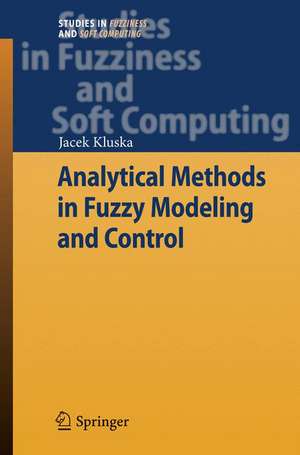Analytical Methods in Fuzzy Modeling and Control: Studies in Fuzziness and Soft Computing, cartea 241
Autor Jacek Kluskaen Limba Engleză Hardback – 10 mar 2009
| Toate formatele și edițiile | Preț | Express |
|---|---|---|
| Paperback (1) | 943.73 lei 43-57 zile | |
| Springer Berlin, Heidelberg – 21 oct 2010 | 943.73 lei 43-57 zile | |
| Hardback (1) | 950.52 lei 43-57 zile | |
| Springer Berlin, Heidelberg – 10 mar 2009 | 950.52 lei 43-57 zile |
Din seria Studies in Fuzziness and Soft Computing
- 20%
 Preț: 999.85 lei
Preț: 999.85 lei - 20%
 Preț: 653.06 lei
Preț: 653.06 lei - 20%
 Preț: 872.98 lei
Preț: 872.98 lei - 20%
 Preț: 930.57 lei
Preț: 930.57 lei - 20%
 Preț: 1051.00 lei
Preț: 1051.00 lei - 20%
 Preț: 992.44 lei
Preț: 992.44 lei - 20%
 Preț: 655.85 lei
Preț: 655.85 lei - 20%
 Preț: 1001.86 lei
Preț: 1001.86 lei - 18%
 Preț: 954.14 lei
Preț: 954.14 lei - 20%
 Preț: 330.10 lei
Preț: 330.10 lei - 20%
 Preț: 333.04 lei
Preț: 333.04 lei - 20%
 Preț: 997.56 lei
Preț: 997.56 lei -
 Preț: 391.61 lei
Preț: 391.61 lei - 20%
 Preț: 647.79 lei
Preț: 647.79 lei - 20%
 Preț: 986.01 lei
Preț: 986.01 lei - 18%
 Preț: 958.56 lei
Preț: 958.56 lei - 20%
 Preț: 996.40 lei
Preț: 996.40 lei - 20%
 Preț: 999.35 lei
Preț: 999.35 lei - 15%
 Preț: 646.43 lei
Preț: 646.43 lei - 20%
 Preț: 651.57 lei
Preț: 651.57 lei - 20%
 Preț: 997.89 lei
Preț: 997.89 lei - 15%
 Preț: 641.03 lei
Preț: 641.03 lei - 20%
 Preț: 1009.74 lei
Preț: 1009.74 lei - 20%
 Preț: 992.62 lei
Preț: 992.62 lei -
 Preț: 388.72 lei
Preț: 388.72 lei - 18%
 Preț: 1223.43 lei
Preț: 1223.43 lei - 20%
 Preț: 651.42 lei
Preț: 651.42 lei - 18%
 Preț: 951.59 lei
Preț: 951.59 lei - 18%
 Preț: 948.61 lei
Preț: 948.61 lei
Preț: 950.52 lei
Preț vechi: 1159.17 lei
-18% Nou
Puncte Express: 1426
Preț estimativ în valută:
181.94€ • 197.69$ • 152.93£
181.94€ • 197.69$ • 152.93£
Carte tipărită la comandă
Livrare economică 21 aprilie-05 mai
Preluare comenzi: 021 569.72.76
Specificații
ISBN-13: 9783540899266
ISBN-10: 354089926X
Pagini: 280
Ilustrații: XXVI, 251 p. 56 illus.
Dimensiuni: 155 x 235 x 20 mm
Greutate: 0.59 kg
Ediția:2009
Editura: Springer Berlin, Heidelberg
Colecția Springer
Seria Studies in Fuzziness and Soft Computing
Locul publicării:Berlin, Heidelberg, Germany
ISBN-10: 354089926X
Pagini: 280
Ilustrații: XXVI, 251 p. 56 illus.
Dimensiuni: 155 x 235 x 20 mm
Greutate: 0.59 kg
Ediția:2009
Editura: Springer Berlin, Heidelberg
Colecția Springer
Seria Studies in Fuzziness and Soft Computing
Locul publicării:Berlin, Heidelberg, Germany
Public țintă
ResearchCuprins
MISO Takagi-Sugeno Fuzzy System with Linear Membership Functions.- Recursion in TS Systems with Two Fuzzy Sets for Every Input.- Fuzzy Rule-Based Systems with Polynomial Membership Functions.- Comprehensive Study and Applications of P1-TS Systems.- Modeling of Multilinear Dynamical Systems from Experimental Data.- Binary Classification Using P1-TS Rule Scheme.
Recenzii
From the reviews:
“This book is intended for researchers, engineers, and graduate students interested in fuzziness and soft computing, engineering, control, and computer engineering.” (IEEE Control Systems and Magazine, Vol. 30, June, 2010)
“This book is intended for researchers, engineers, and graduate students interested in fuzziness and soft computing, engineering, control, and computer engineering.” (IEEE Control Systems and Magazine, Vol. 30, June, 2010)
Textul de pe ultima copertă
This book is focused on mathematical analysis and rigorous design methods for fuzzy control systems based on Takagi-Sugeno fuzzy models, sometimes called Takagi-Sugeno-Kang models. The author presents a rather general analytical theory of exact fuzzy modeling and control of continuous and discrete-time dynamical systems. Main attention is paid to usability of the results for the control and computer engineering community and therefore simple and easy knowledge-bases for linguistic interpretation have been used. The approach is based on the author’s theorems concerning equivalence between widely used Takagi-Sugeno systems and some class of multivariate polynomials. It combines the advantages of fuzzy system theory and classical control theory. Classical control theory can be applied to modeling of dynamical plants and the controllers. They are all equivalent to the set of Takagi-Sugeno type fuzzy rules. The approach combines the best of fuzzy and conventional control theory. It enables linguistic interpretability (also called transparency) of both the plant model and the controller. In the case of linear systems and some class of nonlinear systems, engineers can in many cases directly apply well-known classical tools from the control theory both for analysis, and the design of closed-loop fuzzy control systems. Therefore the main objective of the book is to establish comprehensive and unified analytical foundations for fuzzy modeling using the Takagi-Sugeno rule scheme and their applications for fuzzy control, identification of some class of nonlinear dynamical processes and classification problem solver design.
Caracteristici
Presents mathematical analysis and rigorous design methods for fuzzy control systems based on Takagi-Sugeno fuzzy models Overview about the general analytical theory of exact fuzzy modeling and control of continuous and discrete-time dynamical systems Includes supplementary material: sn.pub/extras













